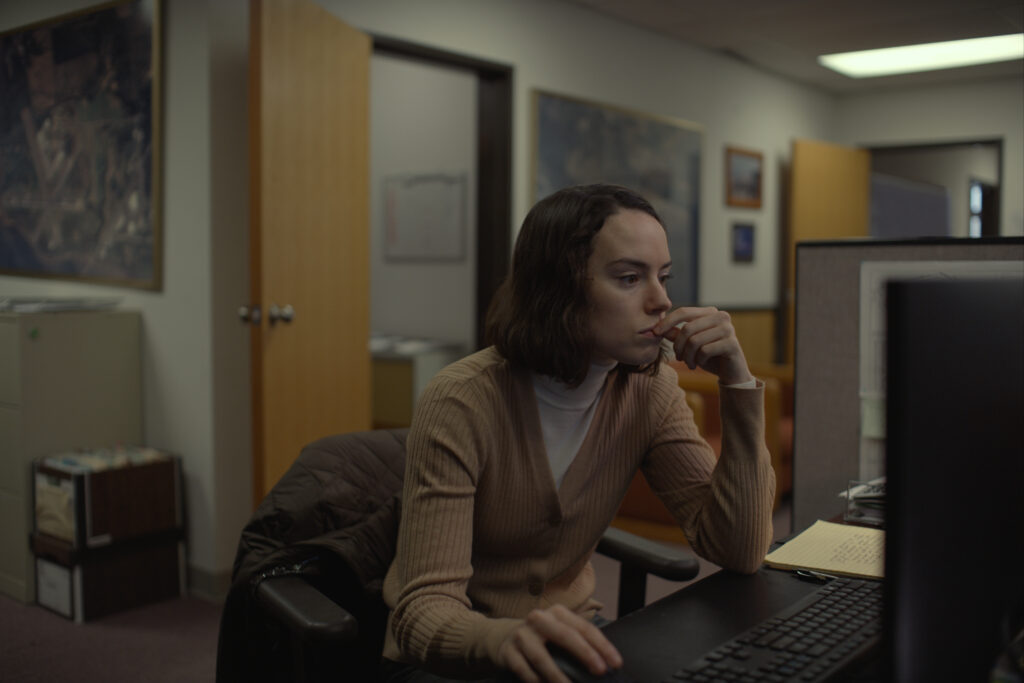Rachel Lambert is a writer-director whose debut feature, “In the Radiant City,” premiered at rave reviews at the Toronto International Film Festival. She received her BFA from Boston University with further study at London Academy of Music and Dramatic Art.
“Sometimes I Think About Dying” is screening at the 2023 Sundance Film Festival, which runs from January 19-29.
W&H: Describe the film for us in your own words.
RL: The film follows a woman named Fran who lives a quiet life in a small coastal Oregon town. She yearns for connection with others, but it often feels out of reach for her. So, for comfort and safety, she retreats into her mind. As a result, her imagination, by the time we meet her in this film, has become her most significant friend. However, the arrival of someone new to her workplace challenges her habits.
It’s a film about a woman’s inner battle between the furtive desire to connect and the familiar retreats into herself that have, heretofore, kept her socially safe.
W&H: What drew you to this story?
RL: I identified with Fran’s sense of isolation in spite of her efforts to connect. I also identified with cultivating a mind space that is very rich and full as a means to cope with that isolation. Additionally, the filmmaking opportunities were substantial. The script was written with such a gracious amount of space for invention and creation by a director, and that was very appealing.
Moreover, I loved the challenge of making a film steeped in a single point of view. That kind of filmmaking fuses cinema with the human mind, in terms of how it thinks, moves, imagines, and sees. For me, that’s the most exciting brand of cinema, when the image and the cut function as thought.
W&H: What do you want people to think about after they watch the film?
RL; I want people to make eye contact on the train ride home or at the coffee shop the next morning. I want people to ask, “How are you?” And to actually hear the answer. I want people to consider not going straight to work or straight to that appointment the way they always do. Maybe instead, they stop for a coffee, or take the long way, or buy a delicious treat and give themselves five minutes of sensation before they go back to their routine. I want people to call their friends.
W&H: What was the biggest challenge in making the film?
RL: Well, like any film, my biggest challenge is getting sleep. I’m in love with my film when I’m making it. I don’t want to be apart from it, or any task related to it, even if it is merely the act of worrying over it. So, I am working on understanding that sleep is not a threat to those instincts. Insert laugh track here.
W&H: How did you get your film funded?
RL: The film was funded by independent financiers.
W&H: What inspired you to become a filmmaker?
RL: A whole life of watching movies, I guess. That inspired me in terms of imagining, and then figuring out, how movies are made. But this idea of “becoming a director” — I think the notion I could even try to direct films professionally wasn’t something I generated of my own accord. I made films and theater since I was a kid. This is not hyperbole. My first play I directed for audiences was in the third grade, and my first film was made during my freshman year of high school. I’ve always directed stories. But it took until I was about 28 before anyone ever suggested that I could or should take this seriously. I’m ashamed to admit that it required the belief of others to instigate any self-belief in regards to becoming a filmmaker.
W&H: What’s the best and worst advice you’ve received?
RL: That’s a little too personal.
W&H: What advice do you have for other women directors?
RL: One piece of advice that has served me well is to not wait for permission.
W&H: Name your favorite woman-directed film and why.
RL: “Fish Tank” by Andrea Arnold. It has such a distinct point of view, presenting something that exists simultaneously as fable and fundamentally lived truth. There’s a freedom to her voice, but it abides an identifiable rigor of thought and principle. Finally, it is unabashedly honest. She surprises me in her filmmaking and in her narratives. Watching her films always teaches me so much.
W&H: What, if any, responsibilities do you think storytellers have to confront the tumult in the world, from the pandemic to the loss of abortion rights and systemic violence?
RL: Art is a form of communication. Very powerful communication, at that. I personally value most any communication that endeavors to offer something of positive consequence to humanity — otherwise what’s the point?
W&H: The film industry has a long history of underrepresenting people of color onscreen and behind the scenes and reinforcing — and creating — negative stereotypes. What actions do you think need to be taken to make Hollywood and/or the doc world more inclusive?
RL: I won’t presume to be able to prescribe what could bring about wholesale transformation to a society diseased by misogyny and bigotry. For me, I try to assess the choices available to me and work within my sphere of influence in the most proactive way possible. In essence, answering for oneself: how can the stories I elect to tell, the actors I elect to cast, the storytellers I elect to finance, the teammates I elect to work with, and the visions I elect to follow contribute to the cultivation of a strong, vital, and powerful alternative to the entrenched and unwavering bulwarks against systemic change?







